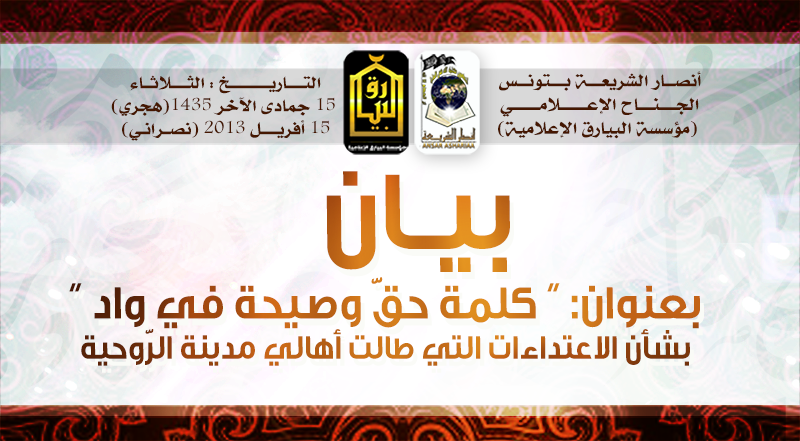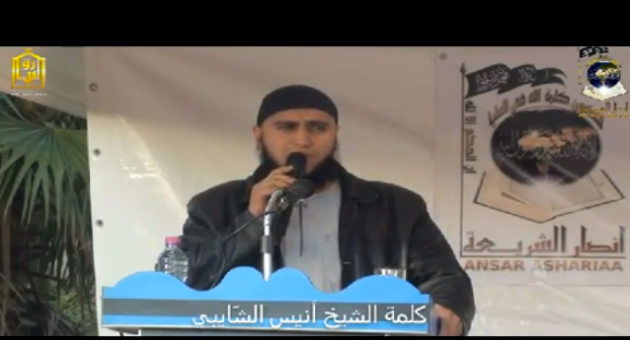السلام عليكم ورحمة الله.
هذه الكلمة لإخواني في أنصار الشريعة في تونس، أكتبها على وجل لأني قصرت في متابعة أحداث تونس ومناصرة إخواني فيها، منشغلا عن ذلك بشأن الشام.
وإني لأعلم أن لي بتونس إخوة لا تنقصهم البصيرة والحكمة والدراية بالواقع ما يغني عن إسهام مثلي، لكنه سهم نسهم به ومناصرة نسأل الله أن يبارك فيها.
أحبتي، يا من تهمون بالمشاركة في الملتقى رغم تهديد وتوعد الجهات الرسمية…إنا لنعلم أن خصومكم بلغوا الدرك الأسفل في خيانة الله والأمانة، والمتاجرة بدمائكم إرضاء لأسيادهم في النظام الدولي، والرفض الوقح للشريعة والنفور والتنفير عنها ومحاولة إخضاع البلاد والعباد لدين الديمقراطية التي تتسع للجميع إلا لدعاة الخير والصلاح من أبناء البلد…بما لا يدع مجالا لتأول لهم ولا لرجاء الخير منهم.
ونعلم أنكم صبرتم على ذلك صبرا حميدا باعثه الإخلاص والتجرد وتقديم مصلحة الدين نحسبكم والله حسيبكم.
ولا يستطيع مثلي أن ينصح بعقد الملتقى أو تعليقه وتحمل تبعات هذه النصيحة، لكني إن قررتم عقد الملتقى فإني أرى لزاما علي أن أذكر إخواني وأحبتي بأمور من واقع خبرة، ((فإن الذكرى تنفع المؤمنين)) وإني أحسبكم إن شاء الله منهم:
1) تجنب لغة التوعد والتهديد على صفحات الإنترنت وفي المقابلات والشعارات المرفوعة قبل المؤتمر وأثناءه، فإن خصمكم قليلَ الأمانة –إن لم يكن عديمها- سيستغل هذه العبارات ويبني عليها أكاذيبه.
حتى عبارات الانتصار، أدعوكم إلى أن تجعلوها “الانتصار للدعوة” حتى لا تبدو عبارات من تأهب للقتال بالسلاح. هذا مع تقديرنا لكون تخويف الخصم الذي لا يردعه دين ولا خلق مطلبا ليكفه عن الفجور في عدوانه، لكن هذه المصلحة قد لا تعدل المفسدة المترتبة على هذه العبارات عندما يلبس بها خصومكم على الناس.
2) الإعلان بوضوح عن متحدثين رسميين باسمكم لا تتحمل الجماعة مسؤولية تصريحات غيرهم. فلا يخفاكم يا حفظكم الله أنه يكثر الاندساس في مثل هذا الوقت.
3) تشكيل لجنة تمنع الناس من رفع شعارات أو النداء بهتافات لا تمثلكم ولا تمثل منهجكم.
4) الحذر من فتنة الميكروفونات ومحبةِ سماع الهتافات المؤيدة، فهذه تجعل المرء يقول أحيانا ما يجر عليه وعلى إخوانه ودعوته ما يحدث الندم بعد فوات الأوان.
5) ضرورة التغطية الإعلامية المكثفة لكل خطوة ونشرها حتى لا ينفرد الآخرون بروايتهم الملفقة.
6) تجنب عبارات الوصف بالكفر والردة. فهذه يفرح بها أهل الأهواء ليحْدثوا بها لدى عامة الناس حالة استغلاق، فتضيع القضية وتُحرمون من بيان الحق للناس ومخاطبة الخير الكامن في فطرهم.
ثم أيها الأحبة إن نجحتم في أن تعرضوا للناس دعوة هادئة نقية ثم رأوا من خصومكم محاربة وقمعا لهذه الدعوة فلسان حال خصومكم سيكون أنطق وأبلغ من ألسنة مقالكم. ولهذا أيضا ننصحكم بالنصيحة السادسة:
7) التركيز في فعالياتكم على عرض ما لديكم من حق دون الكلام عن باطل خصومكم.
ثم نصيحتان أخيرتان مهمتان:
8 ) أن تضعوا –يا بارك الله فيكم- في أذهانكم أننا في مرحلة الدعوة والصبر على تبعاتها. ليس هذا أوان المواجهة بالقوة إخواني. وتذكروا أن سيد الشرفاء الشجعان رسول الله صلى الله عليه وسلم والصحابة معه، أعز الناس نفسا وأكثرهم إباء للضيم، كانوا في مرحلة الدعوة يضربون ويعذبون ويُسخر منهم فيصبرون، لا عن دنية وحاشاهم، لكن لأن المواجهة في غير وقتها مهلكة للدعوة وتغبيش لصورتها في نفوس الناس.
9) كثرة التضرع والدعاء واللجوء إلى الله تعالى في الثلث الأخير من الليل وبعده أن يجعا عاقبة هذا الأمر خيرا وألا يجعل للظالمين عليكم سبيلا.
اللهم احفظ إخواننا في تونس. ربنا أعنهم ولا تعن عليهم وانصرهم ولا تنصر عليهم وامكر لهم ولا تمكر عليهم واهدهم ويسر الهدى لهم، وانصرهم على من بغى عليهم.
_________
To inquire about a translation for this statement for a fee email: [email protected]








